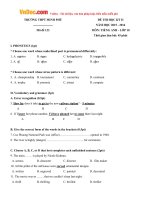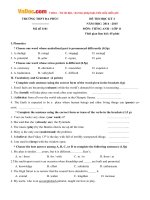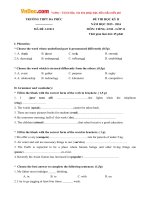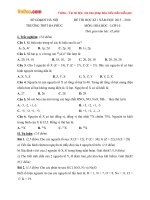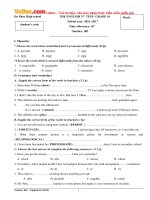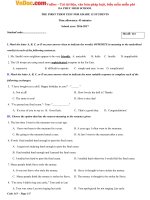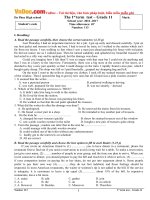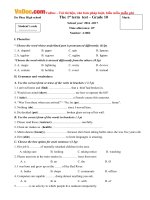Đề thi Olympic môn Tiếng Anh lớp 10 trường THPT Đa Phúc, Hà Nội năm 2014 - 2015
Bạn đang xem bản rút gọn của tài liệu. Xem và tải ngay bản đầy đủ của tài liệu tại đây (191.75 KB, 6 trang )
DA PHUC HIGH SCHOOL
THE OLYMPIC EXAMINATION
Group: English
THE ENGLISH TEST FOR GRADE 10
School year: 2014 - 2015
Time allowance: 90 minutes
Part I: Phonetics (2.5 points)
Question 1-5: Choose one word whose underlined part is pronounced differently
1. A. Doubt
B. Climbing
C. Abnormal
D. Debt
2. A. Embarrassed
B. Beloved
C. Naked
D. Adopted
3. A. Wool
B. Pool
C. Wood
D. Foot
4. A. Breathe
B. Breakfast
C. Already
D. Dreamt
5. A. Sure
B. Poor
C. Tour
D. Sour
Question 6-10: Choose one word whose stress pattern is different from the others
6. A. Photographer B. Destination
C. Participant
D. Professional
7. A. Miraculous
B. Communicate
C. Mysterious
D. Calculating
8. A. Banana
B. Afternoon
C. Umbrella
D. Tomorrow
9. A. Channel
B. Comedy
C. Cartoon
D. Common
10. A. Campfire
B. Provide
C. Destroy
D. Conserve
Part II: Grammar and vocabulary (7.5 points)
Question 11- 25: Choose the best answer
11. Marine plants and animals fall..........three major groups.
A. down
B. in
C. with
D. into
12. My uncle drank a lot of beer, .......made him fat.
A. that
B. which
C. that’s why
D. it
13. I look forward.................seeing all of you soon.
A. at
B. in
C. of
D. to
14. Sue, welcome back. You’ve got a nice...............
A. sun
B. sunlight
C. suntan
D. sunshine
15. The government has sent............................aid to the refugees.
A. human
B. humanitarian
C. humane
D. humanity
16. A forester is a person who works in the forest taking care ........plants and animals.
A. for
B. in
C. at
D. of
C. why
D. who
17. I wonder............your brother looks like.
A. what
B. how
18. The……….are those who don’t have jobs.
A. unemployers
B. unemployed
C. unemployment
D. unemployees
19. Peter told me that he was leaving for the capital…………
A. tomorrow
B. tonight
C. the following day D. next Sunday
20. Plants play ………….important role in the natural circulation of water.
A. a
B. an
C. X
D. the
1
21. We need another ………..of bananas.
A. bundle
B. bunch
C. set
D. flock
22. Students always make excuses when they are late for……school.
A. an
B. a
C. the
D. X
23. ………..he call, tell him I’m out until midnight.
A. If
B. May
C. Should
D. Unless
24. When he graduated from university he got his ………..
A. diploma
B. degree
C. bachelor
D. certificate
25. We should help children from poor families to have proper……….
A. school
B. schooling
C. scholar
D. scholarship
Question 26- 30: Supply the correct form of the word given the brackets
26. The……………………………..are concerned about the oil spill in the sea.
(ENVIRONMENT)
27. It’s impolite to ask about someone’s ……………..status when you first meet him/her. (MARRY)
28. I hate hot weather because it usually makes me feel………………………..
(COMFORT)
29. Some young mothers feel …………………in their own homes.
(PRISON)
30. They danced so……………….that the audience gave them a big applause.
(BEAUTY)
Question 31- 40: Complete the sentence with the correct form of the verb in the brackets
31. You already (give) the job when you got married?
……………………
32. Were I (have) a ship, I would travel around the oceans on earth.
……………………
33. It is the first time I (take) an exam like this.
……………………
34. The film already (show) by the time we got to the cinema last night.
……………………
35. Does that road really need (resurface)?
……………………
36. I’d rather you (keep) your mouth shut.
……………………
37. The laundry has a nice fresh smell from (dry) in the sun.
……………………
38. I wouldn’t waste time (read) that book if I were you.
……………………
39. The teacher had no difficult getting the students (understand).
……………………
40. Had you taken the doctor’s advice, your illness (not/ become) so serious.
……………………
Part III: Writing (5 points)
Question 41-45: Find and correct one mistake in each of the sentences below.
Mistake
Correction
……………….
………………
42. Since Tam’s been in England, he’s got used to drive on the left. .………………
………………
………….……
………………
41. Has anyone ever operated this TV by a remote control?
43. She is going to give birth for a baby in February.
44. Mr. Ba isn’t on the phone, that makes it difficult to contact him. ………………..
………………
45. Had I been late to work this morning, I would miss the regular meeting. ………….…...
………………
Question 46-50: Rewrite the following sentences using the cues given
46. While I strongly disapprove of your behaviour, I will help you this time.
=> Despite…………………………………………………………………..….
2
47. If there is an emergency, ring this number.
=> In case……………………………………………………
48. They firmly believed John was telling the truth.
=> John…………………………………………………………………………
49. It’s more than a fortnight since anyone saw Julian.
=> Julian was……………………………………………………………………
50. Most students can work very hard when they feel like it.
=> Most students are capable……………………………………………….…..
Part IV: Reading (5 points)
Question 51- 55: Choose from the list A-F the most suitable heading for each part of the extract.
There is one extra heading which you do not need to use.
The National Trust is an organization whose aim is to conserve the British countryside. Gill Page visits the
Lleyn Peninsula in North Wales and talks to one of the wardens employed by the Trust to look after the beautiful
areas it owns.
(51)______________
Common sense. That’s what a National Trust Warden needs, according to Gareth Roberts. “ And you definitely
need to be good at handling people, because you’re continually dealing with farmers’ visitor, conservationists and
building firms”.
(52)_______________
Gareth was born and bred on the Lleyn Peninsula and worked on his parents’ farm until his married. About 80
people applied for the post as National Trust Warden for the Lleyn Peninsula. In the end, Gareth’s local knowledge
and farming experience won him the job, despite his lack of formal training.
(53)_______________
“I find it particularly helpful that I still farm with my parents and that I can deal with farmers on the same level
and be aware of their problems. Also, they can’t take me in about anything!” he says. His farming life also means
he is well able to cope with the physical demands of the job – erecting fences, planting trees and building walls.
(54)______________
Gareth says that when he started his job, farmers and conservationists were set against each other. Both sides
wanted things done their way. Now they are talking and can see each other’s point of view. “We’re at the
crossroads and there’s just a small step needed to join them together,” says Gareth.
(55)______________
Conservation is one of the main aspects of Gareth’s work, along with public entry to the Trust’s tenant farmers
“My role is to make sure jobs get finished, with as little fuss and as economically as possible. What I enjoy most is
seeing projects completed, although about half my time is spent on reports, signing bills and so on.”
A.
What makes him good at the job
B.
Towards agreement
C.
Getting things done
D.
Changes the environment
E.
The most suitable candidate
F.
The right qualities for the job
3
Question 56- 60: Read the following passage and choose the best options to complete it
British parents are always complaining that their children spend too much time glued to the telly and not
enough time doing other activities (56)……..sports and reading. A survey recently carried out on people’s viewing
habits does not disprove this. It shows that young people in Britain spend (57)……. average 23 hours a week in
front of the television, which works out 3 hours every day.
(58)……………..is surprising, however, is the fact that the average adult watches even more: an incredible
28 hours a week. We seem to have become a nation of addicts. Just about every household in the country has a
television and over half have two or more. According to the survey, people nowadays don’t just watch TV in their
living-rooms, they watch it in the kitchen and in bed as (59)…………..
The Education Minister said a few weeks ago that Britain’s pupils should spend more time reading.
Unfortunately, parents are not (60)…………..a good example: adults do less reading than young people. In fact,
reading is at the bottom of their lists of favourite pastimes. They would rather listen to the radio, go to the cinema
or hire a video to watch on their television at home.
56..
A. such
B. as
C. like
D. so
57.
A. at
B. on
C. in
D. for
58.
A. Which
B. Who
C. That
D. What
59.
A. well
B. king
C. parents
D. good
60.
A. doing
B. setting
C. making
D. taking
Question 61-70 : Read the following passage and choose the best answer to each question
As the twentieth century began, the importance of formal education in the United States increased. The
frontier had mostly disappeared and by 1910 most Americans lived in towns and cities. Industrialization and the
bureaucratization of economic life combined with a new emphasis upon credentials and expertise to make
schooling increasingly important for economic and social mobility. Increasingly, too, schools were viewed as the
most important means of integrating immigrants into American society.
The arrival of a great wave of southern and eastern European immigrants at the turn of the
century coincided with and contributed to an enormous expansion of formal schooling. By 1920 schooling to age
fourteen or beyond was compulsory in most states, and the school year was greatly lengthened.
Kindergartens, vacation schools, extracurricular activities, and vocational education and counseling extended the
influence of public schools over the lives of students, many of whom in the larger industrial cities were the children
of immigrants. Classes for adult immigrants were sponsored by public schools, corporations, unions, churches,
settlement houses, and other agencies.
Reformers early in the twentieth century suggested that education programs should suit the needs of
specific populations. Immigrant women were once such population. Schools tried to educate young women so they
could occupy productive places in the urban industrial economy, and one place many educators considered
appropriate for women was the home.
Although looking after the house and family was familiar to immigrant women, American education gave
homemaking a new definition. In pre-industrial economies, homemaking had meant the production as well as the
consumption of goods, and it commonly included income-producing activities both inside and outside the home, in
the highly industrialized early-twentieth-century United States, however, overproduction rather than scarcity was
becoming a problem. Thus, the ideal American homemaker was viewed as a consumer rather than a producer.
Schools trained women to be consumer homemakers cooking, shopping, decorating, and caring for children
"efficiently" in their own homes, or if economic necessity demanded, as employees in the homes of others.
Subsequent reforms have made these notions seem quite out-of-date.
61 The paragraph preceding the passage probably discusses _____.
A. the industrialization and the bureaucratization of economic life the United States in the 19th century
B. the formal schooling in the United States in the nineteen century.
C. the urbanization in the United States in the nineteen century.
D. the most important means of integrating immigrants into American society in the nineteen century.
4
62. It can be inferred from paragraph 1 that one important factor in the increasing importance of
education in the United States was _____.
A. the expanding economic problems of schools
B. the growing number of schools in frontier communities
C. an increase in the number of trained teachers
D. the increased urbanization of the entire country
63. The word "means" in line 5 is closest in meaning to _____.
A. qualifications
B. method
C. advantages
D. probability
64. The phrase "coincided with" in line 7 is closest in meaning to _____.
A. happened at the same time as
B. ensured the success of
C. was influenced by
D. began to grow rapidly
65. According to the passage, one important change in United States education by the 1920's was that _____.
A. the amount of time spent on formal education was limited
C. adults and children studied in the same classes
B. new regulations were imposed on nontraditional education
D. most places required children to attend school
66. “Vacation schools and extracurricular activities” are mentioned in line 9 to illustrate _____.
A. activities that competed to attract new immigrants to their programs.
B. alternatives to formal education provided by public schools
C. the importance of educational changes
D. the increased impact of public schools on students
67. According to the passage, early-twentieth century education reformers believed that _____.
A. special programs should be set up in frontier communities to modernize them
B. corporations and other organizations damaged educational progress
C. different groups needed different kinds of education
D. more women should be involved in education and industry
68. The word "it" in paragraph 4 refers to _____.
A. education
B. consumption
C. production
D. homemaking
69. Women were trained to be consumer homemakers as a result of _____.
A. scarcity in the highly industrialized early-twentieth-century United States
B. economic necessity in the highly industrialized early-twentieth-century United States
C. income-producing activities in the highly industrialized early-twentieth-century United States
D. overproduction in the highly industrialized early-twentieth-century United States
70. The word “others” in paragraph 4 means_______.
A. other children
B. other homes
C. other women
____End of the test_____
5
D. other employees
Key to the Olympic test – Grade 10
(School year: 2014-2015)
Part I: Phonetics
1 - 5: 1. C
2. A
3. B
4. A
5. D
6 - 10: 6. B
7. D
8. B
9. C
10. A
Part II: grammar and vocabulary
11 - 25:
26 - 30:
11. D
12. B
13. D
14. C
15. B
16. D
17. A
18. B
19. C
20. B
21. B
22. D
23. C
24. B
25. B
26. environmentalists
28. uncomfortable
27. marital
29. imprisoned
30. beautifully
31 - 40:
31. Had you been given
36. kept
32. to have
37. being dried
33. have taken
38. reading
34. had already been shown
39. to understand
35. resurfacing
40. wouldn’t have become
PART III: WRITING
41. by => with
43. for => to
45. miss => have missed
42. drive => driving
44. that => which
46. Despite my strong disapproval of your behaviour, I will help you this time.
47. In case of an emergency, ring this number.
48. John was firmly believed to be telling the truth.
49. Julian was last seen a fortnight ago.
50. Most students are capable of working very hard when they feel like it.
PART IV: READING
51. F
52. E
53. A
54. B
55.C
56. C
57. B
58. D
59. A
60. B
61. B
62. D
63. B
64. A
65. D
66. A
67. C
68. D
69. D
70. C
6
